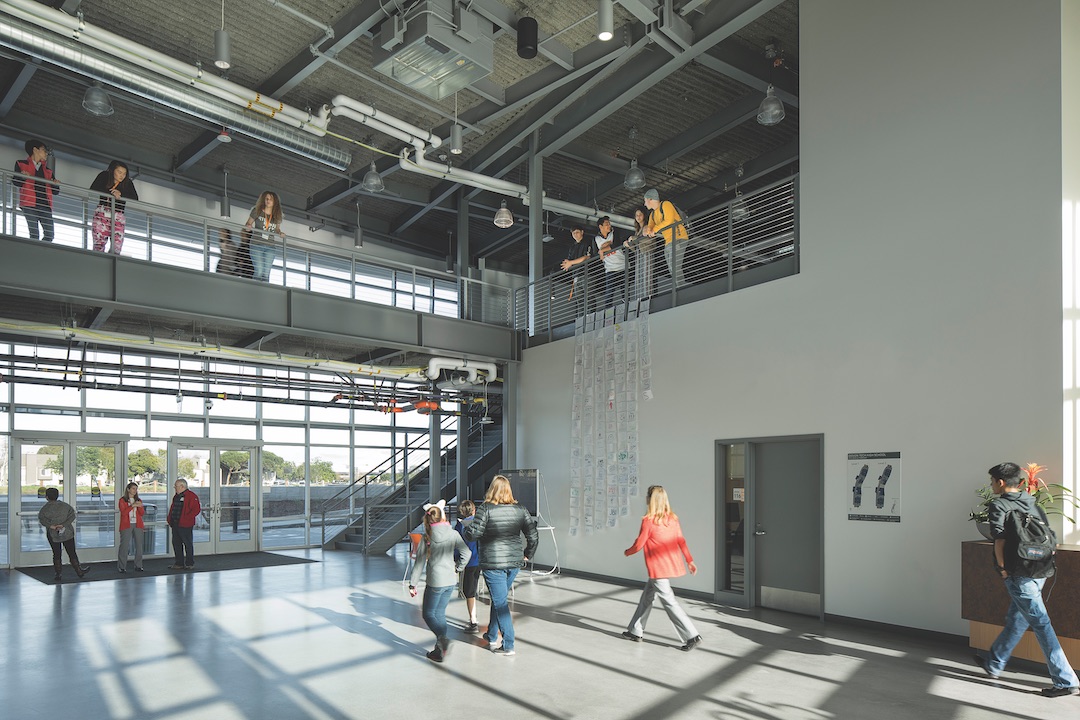Design Tech High School, a tuition-free public charter school, sits on the edge of Oracle Corporation’s tech campus, in Redwood City, Calif. It is the permanent home for what started out, six years ago, as a partnership with a public charter school where Oracle employees and other industry professionals taught two-week project-based workshops, or “intercessions,” for its students.
D.tech, as the two-story school is known, had been occupying temporary spaces that were hardly suited for design thinking. The new building provides expansive fabrication labs and access to thousands of talented professionals. Its curriculum teaches students important technical skills, which they can apply to real-world scenarios.
There were three groups of decision makers on this project: Oracle Corporation, Oracle Education Foundation, and the charter school. As the building’s developer and owner, Oracle was in charge of the building shell design, security, IT, and sustainability. D.tech led the interior planning, including room configurations, adjacencies, and furniture selection. Oracle Education Foundation acted as a facilitator and communications channel between the school and the corporation.
D.tech was completed under budget and ahead of schedule, despite some major obstacles whose navigation required considerable team collaboration. These included weather delays resulting from the area’s wettest winter in 122 years, with 250% more rainfall than anticipated; a budget that was reduced by 18%; and a site that was adjacent to two endangered species habitats and fell under three municipal jurisdictions.
 Design Tech’s angled entry has a continuous metal canopy and articulated glazing that allows visitors to see into the school’s center, where the facility’s two fabrication labs are located.
Design Tech’s angled entry has a continuous metal canopy and articulated glazing that allows visitors to see into the school’s center, where the facility’s two fabrication labs are located.
XL Construction offset the weather delays by developing BIM models, coordinating the project’s MEP engineering, and relying on Lean practices. To manage its subcontractors, as well as to account for the complexity of the building’s S-shape curves, the construction team deployed Trimble Total Station software to plot locations for every scope of work. XL’s Superintendent, Mitch McDonald, laid out all trades’ work at once to coordinate it before anything was put in place.
The project team facilitated more than 50 first-in-place inspections and mockups to ensure that what the architect and end-user wanted was what happened in the field. However, the design and scope were constantly being reviewed, refined, and adjusted to some tough budget decisions that required in-depth value engineering and MEP solutions without undermining the project’s ambition to achieve LEED Gold certification.
Given the site’s location on Oracle’s active campus near San Francisco Bay and the public pedestrian Bay Trail, it was imperative for the Building Team to create a site-specific safety program: twice-daily safety inspections, weekly audits, environmental protection measures, vehicular traffic control, and a rerouting of the trail. There was no lost time due to accidents on a project that tacked 204,184 man-hours.
Students were deeply involved in the high school’s design and construction. They provided key design ideas and reviewing options throughout the process. In early workshops students expressed the importance of maker spaces. As a result, a two-story maker space, known as the Design Realization Garage, became the centerpiece of d.tech’s plan, with everything functioning around it.
Full-height glazing at d.tech’s entrance makes visible the students’ work in the Garage, where the intercessions are also conducted.
The students and design team created a learning neighborhood concept that consists of customizable classrooms, open breakout spaces, and adjacent outdoor patios. The neighborhoods are located at both ends of the building.
 Student interaction is facilitated in the school’s two-level lobby, which looks out onto marshlands.
Student interaction is facilitated in the school’s two-level lobby, which looks out onto marshlands.
The students’ involvement is immediately evident to visitors in the building’s parking lot, where a CAD-generated dragon the students created was painted on the asphalt.
The Building Team’s involvement in d.tech didn’t end when the school opened its doors. Members have given presentations and participated in panel discussions. XL’s team continues to host intercessions for d.tech students on preconstruction, planning, estimating, project management, construction technology, and sustainability.
The benefits of this project extend into the local community, too. A parking lot has been turned into a two-acre park with vastly improved walking trails and cycling paths. Open spaces include a slough-facing plaza, seating nooks, and exercise stations. And a 1,200-foot-long shoreline band was restored to natural conditions by revegetating its slopes with native plants.+
Building Team — Submitting firm XL Construction (GC), Owner/Developer Oracle Education Foundation, Architect/AOR/SE/Landscape DES Architects + Engineers, MEP design Integral Group, ME Silicon Valley Mechanical, EE Cupertino Electric, PE Air Systems, CE BKF Engineers, CM Nova Partners
General information — Size 64,000 sf, Construction cost $33.5 million, Construction time June 2016 to January 2018, Delivery method Design-build MEP








